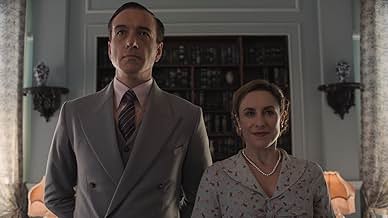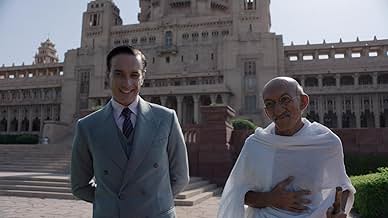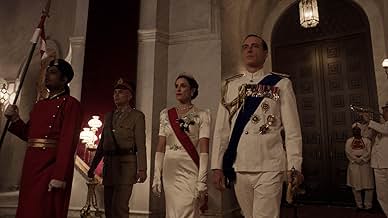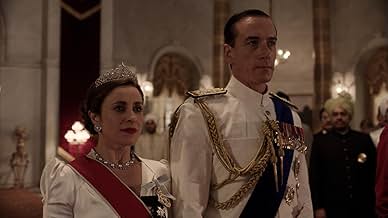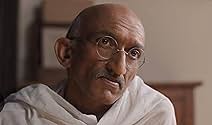Freedom at Midnight
- Série télévisée
- 2024–
NOTE IMDb
8,3/10
2,2 k
MA NOTE
Est l'histoire électrisante de la lutte de l'Inde pour son indépendance. Inspiré du best-seller du même nom, il retrace la partition de l'Inde et du Pakistan ainsi que les dynamiques religie... Tout lireEst l'histoire électrisante de la lutte de l'Inde pour son indépendance. Inspiré du best-seller du même nom, il retrace la partition de l'Inde et du Pakistan ainsi que les dynamiques religieuses.Est l'histoire électrisante de la lutte de l'Inde pour son indépendance. Inspiré du best-seller du même nom, il retrace la partition de l'Inde et du Pakistan ainsi que les dynamiques religieuses.
- Récompenses
- 10 nominations au total
Parcourir les épisodes
Avis à la une
The Freedom at Midnight series on SonyLIV is one of the best historical dramas I've watched to date. Its gripping portrayal of India's independence and the Partition is both emotionally resonant and historically rich. Directed by Nikkhil Advani, the series features brilliant performances by the cast, who breathe life into iconic figures like Gandhi, Nehru, Jinnah, and Mountbatten.
The storytelling is immersive, enhanced by authentic set designs and a hauntingly powerful soundtrack. While the pace is slow in the initial episodes, it builds up to an emotionally charged climax. The depiction of communal tensions and political negotiations is both vivid and thought-provoking.
The actors' nuanced portrayals and the show's attention to detail make it a standout. It's a deeply impactful series that leaves a lasting impression. A must-watch for history enthusiasts!
The storytelling is immersive, enhanced by authentic set designs and a hauntingly powerful soundtrack. While the pace is slow in the initial episodes, it builds up to an emotionally charged climax. The depiction of communal tensions and political negotiations is both vivid and thought-provoking.
The actors' nuanced portrayals and the show's attention to detail make it a standout. It's a deeply impactful series that leaves a lasting impression. A must-watch for history enthusiasts!
At the stroke of midnight on August 14, 1947, India gained freedom from over 200 years of British colonial rule. While the birth of a free India should have been a moment of celebration, it was overshadowed by the darkness of Partition. Nikkhil Advani's Freedom At Midnight, a latest web series on SonyLIV, which takes its title and story from Larry Collins and Dominique Lapierre's seminal book, offers a powerful glimpse into the trials, tragedies, and turmoil of that fateful period.
The series begins in 1946 with a persistent Mahatma Gandhi declaring, "Hindustan ka batwara hone se pehle, mere shareer ka batwara hoga (Before the Partition of India, my body will be divided)." It soon moves over to offer a painful account of India's Partition and the violent birth of Independent India. Religious conflicts, border wars, and political sacrifices unfold with each episode, like dramatic scenes in a grand pageant.
The dialogues and performances strike emotional chords quite effectively. Take, for example, lines like "Aam aadmi vo badlaav laa sakta hai jo sarkaar saalon mein nahi laa sakti" (The common man can bring about change that the government couldn't in years) or "Ye log Hindu hone se pehle bhi Punjabi ya Bengali hain" (These people are Punjabi or Bengali before they are Hindu).
The central characters in the show include Lord Mountbatten, the great-grandson of Queen Victoria, who constantly haggles with Jawaharlal Nehru, the leader of the Congress party, torn between his principles and his party's ideals; Mohammed Ali Jinnah, the fanatical leader of the Muslim League, who sees only two options: "Ya toh Hindustan batega ya barbaad hoga" (Either Hindustan will be divided, or it will be destroyed); and MK Gandhi, who ultimately gives up his dream of a united India, over the terms of how an independent India will move forward.
Siddhant Gupta, who was well admired in Prime Video's Jubilee, once again proves his acting prowess as he steps into the role of India's first Prime Minister, Jawaharlal Nehru. But the standout performance comes from Arif Zakaria as Mohammed Ali Jinnah. He is utterly convincing as the resolute leader of the Muslim League, whose singular vision was the creation of Pakistan. Chirag Vohra as Gandhi and Rajendra Chawla as Sardar Vallabhbhai Patel also deliver strong performances. The supporting cast further elevates the series, adding an extra layer of depth to the story.
Nikkhil Advani closes the show just before the horrors of the Partition unfold on India's land, accompanied by the song "Vaishnav jan to tene kahiye je, peer paraayi jaani re" (A good human being is the one who knows the pain of others). It's a haunting note that leaves you wishing political leaders, from any period - past or present - could truly feel the pain of the people they serve.
Not only is it competently crafted and acted, it also tells a story replete with known and unknown nuggets of information that are processed with skill and sensitivity. It has no grandstanding, and no hectoring and hollering of the sort that mainstream Bollywood is prone to.
The show gives history its due, meticulously piecing together the fragments that went into the making of an essential and wondrous, if inevitably imperfect, whole.
The series begins in 1946 with a persistent Mahatma Gandhi declaring, "Hindustan ka batwara hone se pehle, mere shareer ka batwara hoga (Before the Partition of India, my body will be divided)." It soon moves over to offer a painful account of India's Partition and the violent birth of Independent India. Religious conflicts, border wars, and political sacrifices unfold with each episode, like dramatic scenes in a grand pageant.
The dialogues and performances strike emotional chords quite effectively. Take, for example, lines like "Aam aadmi vo badlaav laa sakta hai jo sarkaar saalon mein nahi laa sakti" (The common man can bring about change that the government couldn't in years) or "Ye log Hindu hone se pehle bhi Punjabi ya Bengali hain" (These people are Punjabi or Bengali before they are Hindu).
The central characters in the show include Lord Mountbatten, the great-grandson of Queen Victoria, who constantly haggles with Jawaharlal Nehru, the leader of the Congress party, torn between his principles and his party's ideals; Mohammed Ali Jinnah, the fanatical leader of the Muslim League, who sees only two options: "Ya toh Hindustan batega ya barbaad hoga" (Either Hindustan will be divided, or it will be destroyed); and MK Gandhi, who ultimately gives up his dream of a united India, over the terms of how an independent India will move forward.
Siddhant Gupta, who was well admired in Prime Video's Jubilee, once again proves his acting prowess as he steps into the role of India's first Prime Minister, Jawaharlal Nehru. But the standout performance comes from Arif Zakaria as Mohammed Ali Jinnah. He is utterly convincing as the resolute leader of the Muslim League, whose singular vision was the creation of Pakistan. Chirag Vohra as Gandhi and Rajendra Chawla as Sardar Vallabhbhai Patel also deliver strong performances. The supporting cast further elevates the series, adding an extra layer of depth to the story.
Nikkhil Advani closes the show just before the horrors of the Partition unfold on India's land, accompanied by the song "Vaishnav jan to tene kahiye je, peer paraayi jaani re" (A good human being is the one who knows the pain of others). It's a haunting note that leaves you wishing political leaders, from any period - past or present - could truly feel the pain of the people they serve.
Not only is it competently crafted and acted, it also tells a story replete with known and unknown nuggets of information that are processed with skill and sensitivity. It has no grandstanding, and no hectoring and hollering of the sort that mainstream Bollywood is prone to.
The show gives history its due, meticulously piecing together the fragments that went into the making of an essential and wondrous, if inevitably imperfect, whole.
This Era Youth Needs to Understand the Real History and I will give freedom at midnight 10/10 as this is eye-opener for the youth. INDIA National Congress Have always thought of both Hindu Muslim in india
The kind of radical thinking going in country needed this eye-opener
The Bond of Jawahar Lal Nehru Andd Sadar Vallabh Bhai Patel Is So Beautiful Brotherly friend
The Way Sadar Vallabh Bhai Patel Respected Gandhi Ji
Jinnah's Thought and The Direct Action Day Plan the brutality happened in india and how Only congress party stood for them shows the unity thought of INDIAN NATION CONGRESS......
The Way Sadar Vallabh Bhai Patel Respected Gandhi Ji
Jinnah's Thought and The Direct Action Day Plan the brutality happened in india and how Only congress party stood for them shows the unity thought of INDIAN NATION CONGRESS......
Freedom at Midnight on Sony Liv reinvigorates the story of India's Independence and partition with fresh energy. Anchored by stellar performances-Mountbatten, Edwina, Attlee, and Jinnah-it balances historical depth with sharp, modern storytelling. Gandhi and Nehru may seem miscast initially but evolve into compelling portrayals.
Focusing on key events like the Muslim League's Direct Action Plan, Congress-Muslim League tussles, 1937 provincial elections, the series skips exhaustive timelines in favor of precision. Highlights include Gandhi's Indigo Satyagraha, where his quiet resolve awes a young Nehru, the layered tension between Jinnah and Nehru, the contrasts between Nehru and Vallabhbhai among others.
With top-tier production-authentic sets, flawless costumes, and pitch-perfect casting-the series sets a new standard for period dramas. Understated performances by Edwina Mountbatten and VP Menon leave a mark, while Louis Mountbatten brings charisma and sophistication. Tight screenplay and sharp dialogues create a thriller-like momentum moving towards partition.
Director Nikhil Advani expertly handles sensitive themes with nuance and objectivity, avoiding glorification or clichés. Freedom at Midnight is a must-watch for its balanced narrative, stunning execution, and fresh take on history.
Focusing on key events like the Muslim League's Direct Action Plan, Congress-Muslim League tussles, 1937 provincial elections, the series skips exhaustive timelines in favor of precision. Highlights include Gandhi's Indigo Satyagraha, where his quiet resolve awes a young Nehru, the layered tension between Jinnah and Nehru, the contrasts between Nehru and Vallabhbhai among others.
With top-tier production-authentic sets, flawless costumes, and pitch-perfect casting-the series sets a new standard for period dramas. Understated performances by Edwina Mountbatten and VP Menon leave a mark, while Louis Mountbatten brings charisma and sophistication. Tight screenplay and sharp dialogues create a thriller-like momentum moving towards partition.
Director Nikhil Advani expertly handles sensitive themes with nuance and objectivity, avoiding glorification or clichés. Freedom at Midnight is a must-watch for its balanced narrative, stunning execution, and fresh take on history.
"Freedom at Midnight" deserves a solid 10/10 for its compelling portrayal of the events surrounding India's independence and partition. The documentary takes an unflinchingly honest approach, covering sensitive topics like the Bengal massacres, showing the horrors faced by hindus by communal violence. It manages to present these events without leaning into any biased narrative, allowing the raw reality of the partition's aftermath to speak for itself.
The creators have done exceptional work in balancing perspectives from all sides, bringing a level of depth and integrity to the narrative. The archival footage, firsthand accounts, and detailed explorations of the political tensions between the British, Hindus, and Muslims make the film not only historically accurate but deeply engaging. It brings to light the complexities of freedom and the tragic consequences of division, leaving viewers with a better understanding of a crucial period in history.
This documentary is a must-watch for anyone interested in unbiased historical documentaries. It goes beyond just recounting facts; it brings history to life, allowing us to reflect on the price of freedom.
The creators have done exceptional work in balancing perspectives from all sides, bringing a level of depth and integrity to the narrative. The archival footage, firsthand accounts, and detailed explorations of the political tensions between the British, Hindus, and Muslims make the film not only historically accurate but deeply engaging. It brings to light the complexities of freedom and the tragic consequences of division, leaving viewers with a better understanding of a crucial period in history.
This documentary is a must-watch for anyone interested in unbiased historical documentaries. It goes beyond just recounting facts; it brings history to life, allowing us to reflect on the price of freedom.
Le saviez-vous
- AnecdotesAdapted from the book of the same name, authored by Dominique Lapierre and Larry Collins.
Meilleurs choix
Connectez-vous pour évaluer et suivre la liste de favoris afin de recevoir des recommandations personnalisées
Détails
- Couleur
Contribuer à cette page
Suggérer une modification ou ajouter du contenu manquant

![Regarder Trailer [OV]](https://m.media-amazon.com/images/M/MV5BOWRlODBkMWItNzdlMC00MDhjLThmNjAtNGYyMzg0NDNlZmI3XkEyXkFqcGdeQXRyYW5zY29kZS13b3JrZmxvdw@@._V1_QL75_UX500_CR0)
